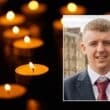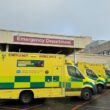
All close contacts of confirmed COVID-19 cases should self-isolate and get a PCR test even if they are fully vaccinated.
That is the latest guidance from Health Minister Robin Swann tonight (Friday) in response to the emergence of the highly transmissible Omicron variant.
It is to take effect from today and, according to the Minister, it will help to keep case numbers as low as possible while the accelerated vaccine booster programme is delivered.
It comes after confirmation tonight of strict regulations coming this weekend for the hospitality industry in the Republic of Ireland.
From Sunday, all venues like bars, cinemas and theatres have been ordered to close from 8pm each evening.
The changes are to remain in place until the end of January but will be kept under review.
Here is Northern Ireland the self-isolating direction comes in a bid to keep down levels of the variant amid fears of an extemely rapid spread.
Health Minister Swann said: “Up until now, the Public Health Agency (PHA) has been managing suspected Omicron cases on an individual basis and asking all of their close contacts to isolate for 10 full days. This was the right approach to help slow spread when the variant first arrived and there were very few cases.
“However, the number of Omicron cases continues to rise rapidly and it is clear that community transmission is now established. The clear public health advice is that we must act now. The urgent priority is to rapidly isolate all close contacts, including from today those who are fully vaccinated, asking that all contacts get PCR tested in order to identify cases as quickly as possible.
“It continues to be the case that close contacts who are unvaccinated or partially vaccinated should isolate for ten full days after the last date of contact.”
Professor Sir Michael McBride, Chief Medical Officer, said: “In keeping with other parts of the UK, growth of the Omicron variant in Northern Ireland is extremely fast. Consequently, a more stringent approach to the management of close contacts of all COVID-19 cases is now required to help minimise spread.
“It is inevitable, in spite of the containment measures that have been introduced since the variant first emerged, that case numbers in Northern Ireland will continue to grow rapidly. We must do everything we possibly can to slow the spread of the virus to protect the public and to protect our health and social care system from becoming overwhelmed as it faces these very challenging winter months.
“It is vital that we are afforded the maximum time to get booster jabs to as many people as possible as quickly as we can. Vaccination remains the single most important thing we can do to protect ourselves from serious illness and reduce the chances passing the virus on to those around you.
“The booster programme is being accelerated significantly and it’s also very important that people who are not yet vaccinated come forward for their first dose without delay.”
Health Minister Swann added: “I am very encouraged to see the numbers of people coming forward for first and second doses and booster jabs in recent days and weeks, but it must be emphasised that we cannot rely solely on the booster programme to combat Omicron.
“We all have a vital role to play in not spreading the virus and these changes announced today, whilst difficult, are required urgently. We need to keep making safer choices in our daily lives and to regularly use lateral flow tests to help protect each other.”
The full detail of the new guidance for all close contacts is as follows:
Fully vaccinated close contacts – defined as at least 14 days after second dose of MHRA approved vaccine. Isolate immediately and book a PCR test as soon as possible. If the PCR test is negative, isolation can stop but the close contact should take a daily lateral flow test every day after the negative PCR result until the 10th day after the last date of contact. A day 8 PCR test is no longer recommended. If the close contact develops symptoms they should isolate immediately and book a PCR even if the lateral flow test is negative. If any lateral flow test is positive the close contact should isolate immediately and book a PCR test.
School aged children and young people – Isolate immediately and book a PCR test as soon as possible. If the PCR test is negative, isolation can stop but the close contact should take a daily lateral flow test every day after the negative PCR result until the 10th day after the last date of contact. A day 8 PCR test is no longer recommended. If the close contact develops symptoms they should isolate immediately and book a PCR even if the lateral flow test is negative. If any lateral flow test is positive the close contact should isolate immediately and book a PCR test.
Children under 5 will continue to be asked to take a PCR test as soon as possible but will now be asked to self-isolate immediately. If this PCR test is negative or, recognising the particular difficulty with testing some children of this age, if it is not possible to carry out a PCR, isolation can stop as long as they do not develop symptoms. Daily lateral flow tests are not required.
There are no changes proposed for adult close contacts who are unvaccinated or partially vaccinated. They should continue to isolate immediately and for 10 full days after the last date of contact. Unvaccinated or partially vaccinated adult close contacts should also book and take a PCR test on days 2 and 8 after the last contact. Unvaccinated or partially vaccinated adult close contacts should continue to isolate for 10 full days even if PCR tests are negative. If symptoms develop, they should book another PCR test.





